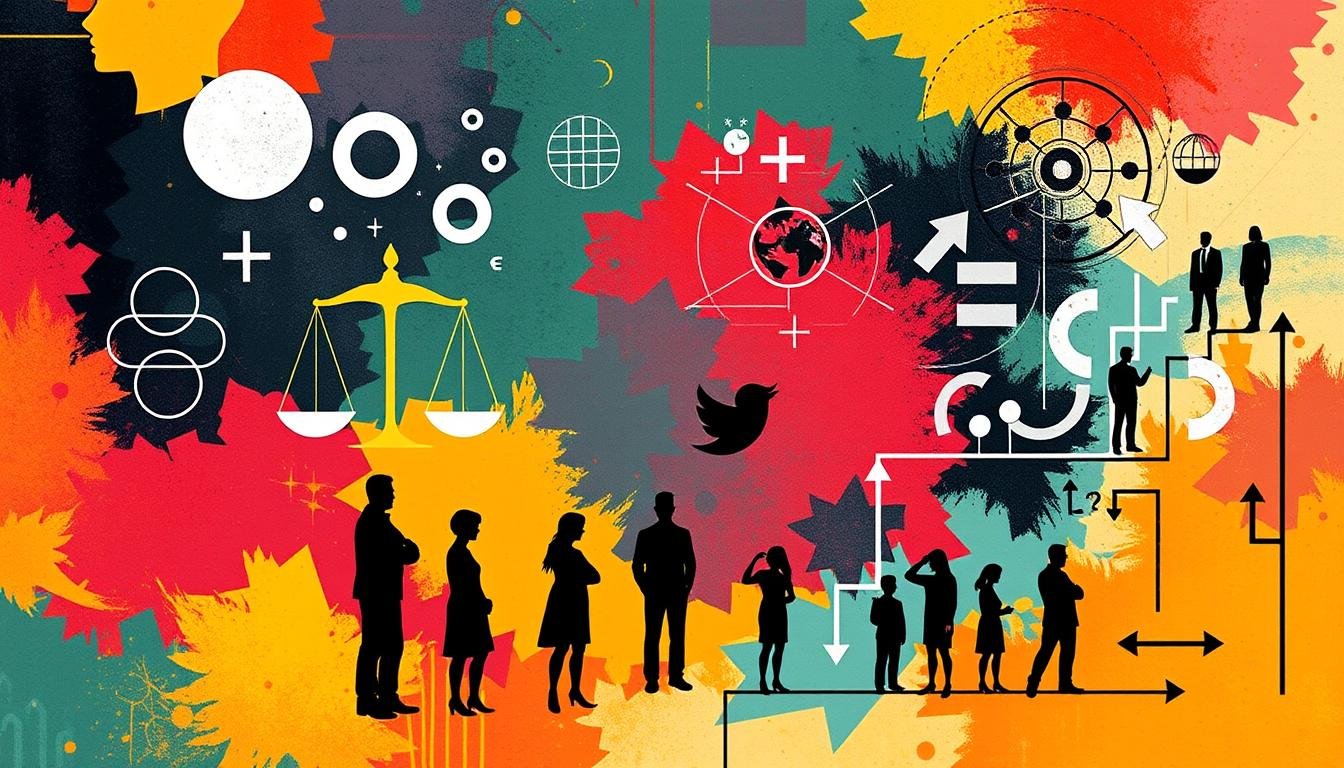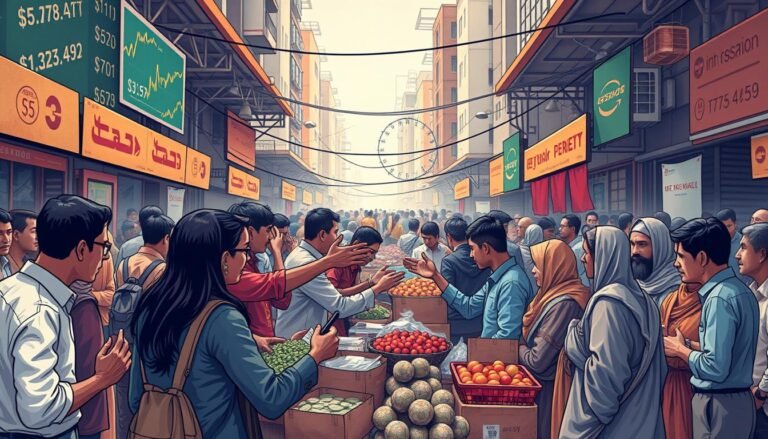Rational Choice Theory in Sociology: Key Concepts
Can human behavior be explained by a simple cost-benefit analysis? This question is at the core of rational choice theory. It has sparked both excitement and debate in sociology and other fields.
Rational choice theory says people act rationally to get the most benefits and avoid costs. This idea started with philosopher Adam Smith. In the 1950s and 1960s, sociologists like George C. Homans, Peter Blau, and James Coleman linked it to social exchange.
The main ideas of this theory are about making choices to get the most out of life. These ideas help us understand many areas, from economics and politics to how we deal with addiction and social work.
Even though rational choice theory helps us see how people make decisions, it’s not perfect. Some say it misses out on our gut feelings and actions that aren’t just about us. Yet, it’s still a key tool for making sense of and predicting social events.
Key Takeaways
- Rational choice theory sees people as rational actors aiming for the best benefits.
- It started with Adam Smith’s ideas and became popular in the 1950s-60s.
- Important ideas include making the most of what you have and weighing costs and benefits.
- This theory is used in many areas like economics, politics, and sociology.
- Some critics say it doesn’t consider non-rational factors in decision-making.
- It’s still important for understanding how people behave and what happens in society.
Introduction to Rational Choice Theory
Rational choice theory is key in modern economics and social sciences. It helps us understand how people decide in different situations. People look at costs and benefits to pick the best choice for themselves.
Definition and Basic Principles
This theory believes people act in their own best interest. It says people do a cost-benefit analysis when making choices. This analysis helps them pick the option that makes them the most happy or satisfied.
Historical Development
The idea of rational choice theory started in the 18th century. Adam Smith, known as the father of modern economics, first talked about it in his 1776 book “An Inquiry Into the Nature and Causes of the Wealth of Nations”. Over the years, it grew and was used in fields like political science, sociology, and game theory.
Importance in Social Work and Sociology
Rational choice theory is very important in social work and sociology. It explains why people and groups act the way they do, predicts social outcomes, and helps design better interventions. It also connects with social exchange theory, showing how people decide in social situations.
| Field | Application of Rational Choice Theory |
|---|---|
| Economics | Understanding market behavior and consumer choices |
| Political Science | Analyzing voting patterns and policy decisions |
| Sociology | Explaining social phenomena and collective action problems |
| Game Theory | Modeling strategic interactions between rational decision-makers |
While rational choice theory gives us useful insights, it’s not perfect. Critics say it doesn’t fully capture how people behave, especially in complex situations. Still, it’s a strong tool for understanding how people make decisions in different areas.
Core Assumptions of Rational Choice Theory
Rational choice theory is a key idea in social sciences. It has three main assumptions. First, people act for their own benefit. Second, they try to get the most out of life. Third, they make choices based on all the information they have.
This idea is the foundation of the rational actor model. It is used in many fields.
The theory has different versions. Some are ‘thin’ and stick to simple assumptions. Others are ‘thick’ and offer deeper views on rational thinking. These differences focus on how rational people are, what they want, and how they act alone.
Rational choice theory often uses the prisoner’s dilemma to explain how people make decisions when things are uncertain. This game shows how people might pick their own gain over working together, even if everyone would do better together.
Some say the theory doesn’t fully capture how people behave. To fix this, fields like behavioral economics have come up. They combine psychology and brain science to make a more accurate model of decision-making. These new ideas try to improve the theory while keeping its useful parts for understanding society.
Rational Choice Theory in Sociology: Key Concepts
Rational choice theory is a big deal in sociology. It explains human actions using economic ideas. It draws from social exchange theory and game theory to understand how we make decisions.
Individual Rationality
Individual rationality says people act based on what they want. They pick options that bring the most benefits and cut costs. For instance, voters might pick a candidate they think will help them the most.
Utility Maximization
Utility maximization is a big part of rational choice theory. It means people try to get the most out of their choices. This could be about getting money, feeling good, or fitting in with others.
Cost-Benefit Analysis
Cost-benefit analysis is a key method in rational choice theory. It’s about looking at what you might gain versus what you might lose. This helps explain why people do what they do in different situations.
Methodological Individualism
Methodological individualism believes that what happens in society comes from what individuals do. It says to understand society, we need to look at individual choices first.
| Concept | Description | Example |
|---|---|---|
| Individual Rationality | People make choices based on personal preferences | Choosing a political candidate |
| Utility Maximization | Striving for the most value from decisions | Balancing work and leisure time |
| Cost-Benefit Analysis | Weighing potential gains against possible losses | Deciding to pursue higher education |
| Methodological Individualism | Social phenomena result from individual actions | Market trends emerging from consumer choices |
Applications of Rational Choice Theory in Social Sciences
Rational choice theory is used in many areas of social sciences. It helps explain how people make decisions in different situations. This includes everything from buying things to making political choices and how people interact with each other.
Economics and Business
In economics, rational choice theory is key to understanding how people decide what to buy. It says people look at costs and benefits when making choices. Investors use this idea to pick stocks, buying those that are cheaper and selling those that are too expensive to make more money.
Politics and Voting Behavior
Political scientists use rational choice theory to study voting and policy decisions. They see voters as making choices based on what they think will help them personally. This helps predict who will win elections and why people support certain policies.
Social Phenomena and Institutions
Sociologists apply rational choice theory to look at how people interact and how institutions change. It helps explain situations where individual goals and group goals don’t match. The prisoner’s dilemma is a famous example. It shows how acting in your own best interest can lead to bad results for everyone.
| Field | Application | Example |
|---|---|---|
| Economics | Consumer behavior | Purchasing decisions |
| Politics | Voting patterns | Election predictions |
| Sociology | Social interactions | Network formation |
| Psychology | Decision-making | Cognitive behavioral therapy |
Rational choice theory also has uses in psychology and social work. Therapists use it to understand why people act a certain way and how to help them change. Students of social work learn about this theory to guess what will happen in society and how to better help people.
Rational Choice Theory vs. Other Sociological Theories
Rational choice theory is unique in focusing on how individuals make decisions. It’s different from psychodynamic theory, which looks at the unconscious mind. Rational choice theory also stands out from structural-institutional theories and cultural theories, which focus on society’s impact.
This theory is more popular in political science than in sociology. By 1992, nearly 40% of articles in the American Political Science Review used rational choice ideas. But, sociology departments in the U.S. rarely focus on it or offer jobs for experts in this area.
Rational choice theory is good at explaining both individual and group actions. It helps predict social outcomes by looking at individual choices. However, some say it simplifies human behavior by ignoring feelings and impulses.
| Theory | Focus | Key Concept |
|---|---|---|
| Rational Choice | Individual decision-making | Cost-benefit analysis |
| Psychodynamic | Unconscious processes | Internal psychological conflicts |
| Structural-Institutional | Social structures | Institutional constraints |
| Cultural | Societal influences | Shared beliefs and values |
Rational choice theory is still important in fields like criminology. It has led to practical solutions like situational crime prevention. This shows the theory’s value and its ability to make a difference in the real world.
Strengths of Rational Choice Theory
Rational choice theory is a strong way to understand human actions in many areas. It’s great at explaining why people act alone or together, predicting what will happen in society, and being useful in many fields.
Explaining Individual and Collective Behaviors
This theory is great at simplifying complex social issues. It shows why people choose one thing over another by looking at what they think are the pros and cons. For example, richer people often vote for right-wing parties, while poorer people vote for left-wing ones.
Predicting Social Outcomes
Rational choice theory is also good at guessing what will happen in society. In economics, it helps predict how people will act as consumers. For instance, more people are joining the fitness industry because they see the health benefits as worth the effort.
Versatility Across Disciplines
This theory can be applied in many areas. In criminology, it helps understand why some people might choose to break the law. In social work, it guides how to help people by looking at their reasons for acting a certain way. It brings a common way to study human choices in fields like social exchange theory and game theory.
“Rational choice theory provides a unified framework for understanding all human behavior.” – Gary Becker
Rational choice theory gives deep insights into how we make decisions. It’s a key tool for researchers and experts in many areas.
Criticisms and Limitations of Rational Choice Theory
Rational Choice Theory (RCT) has faced many challenges in understanding human actions. Critics say it misses out on actions not done for personal gain, ethics, and social norms. It also has trouble with collective action problems and the prisoner’s dilemma, where acting rationally doesn’t always help the group.
One big issue is RCT’s focus on individual choices. It doesn’t fully capture social phenomena or structural issues that go beyond personal decisions. For instance, following social norms or joining collective actions isn’t always about personal gain.
Another problem is RCT’s assumption that people know all their options and outcomes. In real life, people often don’t have all the information. They make decisions based on norms, morals, or practical knowledge. This shows up when looking at complex social or economic behaviors that don’t fit with rational expectations.
- RCT lacks contextualization of human actions
- It doesn’t account for moral orientations influencing decisions
- The theory struggles to explain altruistic behaviors or philanthropy
- Empirical results, especially in behavioral economics, challenge RCT’s assumptions
These criticisms show the ongoing debate about RCT’s ability to fully explain human behavior. While it offers insights in some areas, its limits suggest we need more detailed theories in sociology and related fields.
Rational Choice Theory in Social Work Practice
Rational choice theory is key in social work. It helps professionals understand why clients act the way they do. This theory uses social exchange and utility maximization to improve the bond between clients and social workers.
Understanding Client Motivations
Social workers look at rational choice theory to understand clients’ decisions. This theory says people think about the pros and cons before making choices. By seeing things this way, social workers can understand why clients might make choices that seem harmful.
Designing Interventions and Treatments
When making treatment plans, social workers think about how clients make decisions. This helps them make interventions that seem good to clients. By showing how treatments can help, social workers make clients more likely to follow through and see positive results.
Enhancing Client-Social Worker Relationships
Rational choice theory makes the relationship between clients and social workers stronger. By seeing clients as capable thinkers, social workers build trust. This leads to better problem-solving through open talks about the pros and cons of choices.
| Aspect of Social Work | Application of Rational Choice Theory |
|---|---|
| Client Assessment | Analyzing decision-making patterns |
| Treatment Planning | Framing interventions as beneficial choices |
| Resource Allocation | Optimizing based on client preferences |
| Family Dynamics | Examining individual roles and choices |
By using rational choice theory, social workers can create better strategies. These strategies help support clients’ well-being and growth.
Recent Developments and Extensions of Rational Choice Theory
Rational choice theory has grown to tackle its critics and improve its reach. It now includes behavioral economics, offering new views on how we make decisions. This mix recognizes that our choices aren’t always logical, due to biases and emotions.
Prospect theory is a big step forward. It explains how we see losses and gains differently. This idea helps us understand why some people choose crime, by looking at what they think they gain or lose.
Studies like Baker and Piquero’s (2010) give us more insight into this. They show how the benefits of crime affect our choices.
The idea of bounded rationality is also important now. It says we make decisions with limited info and abilities. This matches with Grasmick and Bursik’s (1990) work on how our choices are shaped by others and our own morals.
Recent research points out the role of social preferences in antisocial acts. It shows that caring for others can stop risky behaviors like drunk driving. This shows rational choice theory can apply to more than just self-focused individuals.
Source Links
- Introduction to Rational Choice Theory
- Rational Choice Theory: What It Is in Economics, With Examples
- Rational choice theory
- Rational Choice Theory: What It Is in Economics, With Examples
- Britannica Money
- Rational Choice Theory
- No title found
- What is Rational Choice Theory?
- Rational Choice Theory in Sociology/Criminology – CriminologyWeb
- Rational Choice Theory in Sociology (Examples & Criticism)
- Rational Choice Theory Toward a Psychological, Social, and Material Contextualization of Human Choice Behavior
- Criticisms And Limitations Of Rational Choice Theory And Game Theory – FasterCapital
- Rational Choice and Sociology
- LibGuides: Social Work Theories: Rational Choice Theory
- Social Work and Theories
- JRC707240 1..22
- Rational Choice Theory







